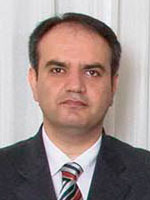
When Vahid Tizfahm was in solitary confinement in Iran — being punished for his faith as a Baha’i — some of his friends came to the prison with a present for the first day of spring.
It was a beautiful flower, planted in a pot.
Unusually for such a bleak place, a guard agreed to take it to Vahid’s cell in the most notorious section of Tehran’s infamous Evin Prison.
Wrote Vahid: “What a spring I had during those days, and what an amazing few days that I spent with that flower!
“I cared for it and watered it to lengthen my spring, as it had been months since I had savoured such a fragrance or seen a beautiful face such as that of the flower.
“With that flower, life, being, happiness and love were breathed into me.”
That account, told by his sister-in-law Ferdos Nikoumanesh, speaks much about the great qualities of Vahid Tizfahm — his ability to enjoy life in the most adverse of circumstances, his gratitude, his love of beauty, his gentle nature.
Vahid Tizfahm is one of seven members of the national Baha’i leadership group in Iran who selflessly attended to the spiritual needs of the Baha’i community in such matters as weddings and funerals.
Despite previously tacitly approving this activity for years, the authorities arrested the group in 2008.
All the members have now served seven years of a 20 year sentence. A seven day campaign, 14-21 May, is calling for their release. The theme is “Seven days in remembrance of seven years in prison for the seven Baha’i leaders.” The hashtag is #7Bahais7years
Throughout Australia and the world, Baha’is, their friends and many inspired by the seven are attending devotional meetings, praying for the leaders.
Highly valued
Vahid Tizfahm, who is married with one child, is the youngest of the seven leaders. His son, who was in grade three when Vahid was arrested, has had to grow up without his father’s presence over the past seven years.
Vahid is just the kind of citizen that most societies value highly. He studied optometry then owned an optical shop in Tabriz.
Before he had his freedom so cruelly taken from him, he spent his free time teaching spiritual lessons to children, organising positive and enjoyable activities for youth, and encouraging people in general.
Vahid Tizfahm had long known what it can mean to be true to his Baha’i belief.
When he was only nine years old, the authorities executed his beloved father for refusing to deny his belief in the Baha’i Faith. These beliefs include the principle of the oneness of humanity —that we are all part of the same human family, in the richness of our diversity, and that we are all fundamentally spiritual beings.
His father remained strong and serene throughout his ordeal. Now Vahid himself is displaying similar qualities.
Meanwhile, people the world over are calling for the immediate release of this remarkable person and of his six highly respected and deeply loved colleagues.
Join the Baha’i International Community’s #7bahais7years event page on Facebook
Leave a Reply